Blog
- 2024
- April
- March
- February
- January
- 2023
- December
- November
- October
- August
- July
- June
- May
- April
- March
- February
- January
- 2022
- December
- November
- October
- September
- August
- July
- June
- May
- April
- March
- February
- January
- 2021
- December
- November
- October
- September
- August
- July
- June
- May
- April
- March
- February
- January
- 2020
- December
- November
- October
- September
- August
- June
- April
- March
- February
- January
- 2019
- December
- November
- October
- September
- August
- April
- March
- January
- 2018
- September
- August
- July
- May
- March
- February
- January
- 2017
- December
- November
- September
- August
- July
- June
- May
- April
- March
- February
- January
- 2016
- December
- November
- October
- March
- February
- January
- A Most Beautiful Thing (1)
- A Most Beautiful Thing Inclusion Fund (1)
- ABC Park (2)
- access to greenspace (1)
- access to nature (2)
- access to outdoors (1)
- accessibility (1)
- active kids (1)
- adolescence (1)
- adolescent recreation (1)
- adolescent wellbeing (1)
- afterschool programming (1)
- agents of change (1)
- agricultural education (1)
- agricultural literacy (3)
- agritourism (1)
- Air Alliance Houston (1)
- albuquerque (1)
- Alex Bailey (1)
- american hiking society (1)
- antarctic tourism (1)
- antiracism in the outdoors (1)
- arizona (1)
- Arshay Cooper (2)
- arts education (2)
- Asheville (1)
- athletic surfaces (1)
- Atlanta (1)
- Atlanta Track Club (1)
- Atlanta Youth Rugby (1)
- Atlanta Youth Tennis (1)
- audubon texas (2)
- ayana elizabeth johnson (1)
- backyard basecamp (1)
- Bakeyah Nelson (1)
- baltimore woods nature center (1)
- barriers to recreation (1)
- basketball (1)
- Bearings Bike Shop (1)
- benefits of recreation (1)
- Beyond the Game (1)
- big brothers big sisters (1)
- biological anthropologist (1)
- bipoc youth (2)
- bipoc youth programming (1)
- bird identification (1)
- birds in my neighborhood (1)
- Black outdoor recreation (1)
- black outside (1)
- Black Outside (1)
- Bloom Project (1)
- Blue Sky Funders Forum (1)
- boatbuilding (2)
- Bob Crawford (1)
- boys & girls clubs (1)
- Boys & Girls Clubs of Puerto Rico (1)
- bronx river (1)
- brower youth award (1)
- brushwood center at ryerson woods (1)
- buffalo harvest (1)
- Caitlin Reilly (1)
- california (1)
- california schoolyard forest system (1)
- camp counselors (1)
- camper education (1)
- Camping & Education Foundation (1)
- Camping to Connect (1)
- canoe camping (1)
- canopy coverage (1)
- capacity building (1)
- carbon sink (1)
- casel social emotional learning standards (1)
- center for native american youth (1)
- CETA Foundation (1)
- challenge (2)
- challenge course (1)
- Charles E. Hartsoe Fellow (1)
- Charles Roundtree Bloom Project (1)
- Chicago CRED (1)
- Children & Nature Network (3)
- children & nature network (3)
- children and nature network (1)
- children's forest of central oregon (1)
- children's screen time action network (1)
- cincinnati (1)
- citizen science (2)
- City Kids Wilderness Project (1)
- civic engagement (1)
- CJ Goulding (1)
- climate action (5)
- climate anxiety (1)
- Climate Change (1)
- climate change (13)
- climate impacts (1)
- climate joy (1)
- climate justice (1)
- climate mental health network (1)
- climate movement (1)
- coach training (2)
- cold weather fun (1)
- collaboration (1)
- collective action (1)
- collective resistance (1)
- College of Natural Resources (1)
- communal learning (1)
- communication (1)
- communities of care (1)
- community building (1)
- community connection (1)
- community engagement (4)
- community learning (1)
- community level environmental literacy (1)
- community mentorship (1)
- community nature connection (2)
- community organization (2)
- community organizations (1)
- community programming (1)
- community violence (1)
- competitive jump rope (1)
- connection to nature (7)
- connection to place (1)
- conservation behavior (1)
- cooking with kids (1)
- cool learning experience (1)
- cornell lab of ornithology (1)
- coronavirus (4)
- courage ranch (1)
- CourtBuilders (1)
- COVID safety (1)
- COVID-19 (6)
- covid-19 (1)
- Cranbrook (1)
- Crawford Prize (7)
- crawford prize (1)
- crew (1)
- cultivating community (1)
- cultural connection (1)
- Darryl Taylor (2)
- Davidson College (1)
- Day of Sport (1)
- debt-ceiling crisis (1)
- decolonization (1)
- deficit thinking (1)
- deforestation (1)
- DEI outdoors (1)
- Department of Parks, Recreation and Tourism Management (1)
- Department of Parks, Recreation, and Tourism Management (1)
- Derwin Hannah (2)
- Detroit (1)
- detroit horse power (1)
- digital tools (1)
- diné we can (1)
- disabled hikers (1)
- displacement (1)
- diversity education (1)
- diversity equity and inclusion (5)
- diversity in nature (2)
- diversity in the outdoors (1)
- dr. teresa horton (1)
- drowning (1)
- eagle eye institute (1)
- early adulthood (1)
- earth day (1)
- earth day with kids (1)
- east st louis (2)
- eastern sierra conservation corps (1)
- eco-anxiety (2)
- Eco-Health (1)
- ecoanxiety (1)
- eden place nature center (1)
- Elliott Donnelley Youth Center (1)
- Elsie McCabe Thompson (1)
- Emerson Collective (1)
- empathy (2)
- English Avenue (1)
- EnviroAtlas (1)
- environment (1)
- environmental action (2)
- Environmental Activism (1)
- environmental activism (1)
- environmental change (1)
- environmental crisis (1)
- environmental degradation (1)
- environmental education (7)
- environmental funding (1)
- environmental future (2)
- environmental hope (2)
- environmental justice (2)
- environmental leaders (1)
- environmental leadership (1)
- environmental learning for kids (1)
- environmental literacy (2)
- environmental movement (3)
- environmental science for kids (1)
- environmental sustainability (1)
- environmentalism for kids (1)
- EPA (1)
- equine-assisted therapy (1)
- equine-based programming (1)
- equitable access (1)
- equitable learning (1)
- equity (4)
- equity in the outdoors (2)
- evaluation (1)
- evaluation methods (1)
- evaluation starter kit (1)
- evaluation support (1)
- evaluation with youth (1)
- every kid outdoors (1)
- evolutionary and ecological approaches to health and development program (1)
- experiential education (2)
- experiential learning (2)
- exploratory learning (1)
- exploratory STEM (1)
- explore fund (1)
- extreme heat (2)
- families outside (1)
- family fun (1)
- family holidays (1)
- family recreation (1)
- family relationships (1)
- Family Time (1)
- farmers markets (1)
- female athlete (1)
- Fernando Lloveras (1)
- Finding Nature (1)
- flint river watershed coalition (1)
- food literacy (1)
- food systems (2)
- forest bathing (1)
- forest therapy (1)
- funding (1)
- funding opportunity (1)
- Gang Rescue and Refinement Passages (1)
- Gary Hall (1)
- gear libraries (1)
- Georgia FIRST Robotics (1)
- get into nature (3)
- get outside (1)
- girl scouts (1)
- girls in STEM (1)
- girls on the run (1)
- girls outdoors (1)
- girlventures (2)
- global forest watch (1)
- gloria barron prize for young heroes (1)
- grant opportunity (1)
- grantee cohorts (2)
- Grantee Highlight (1)
- grantee resources (1)
- grantee spotlight (1)
- grantmaking (1)
- grants (2)
- greater newark conservancy (2)
- green camps (1)
- green design (1)
- green infrastructure (1)
- green schoolyard movement (1)
- green schoolyards (1)
- green schoolyards america (1)
- greening youth foundation (1)
- greenspace (6)
- greenspace access (5)
- group cohesion (1)
- group experiences (1)
- gulf gathering for climate justice and joy (1)
- hands and hearts for horses (2)
- hands on activities (1)
- Hartsoe Fellow (1)
- healing through nature (2)
- health (1)
- health and wellbeing (1)
- health benefits of nature (1)
- healthy competition (1)
- healthy eating (1)
- healthy families (1)
- healthy kids (2)
- healthy living (1)
- healthy relationships (1)
- heat mitigation (2)
- heat safety (1)
- heatwavces (1)
- heptathalon (1)
- heritage trails partnership of the Mississippi gulf coast (1)
- higher education (1)
- hip hop for change (1)
- holistic support (2)
- Horizons-Upward Bound (1)
- horseback riding (1)
- how to save a planet (1)
- Howard University (1)
- identity exploration (1)
- IMC Charities (1)
- impact grants (1)
- inclusion (1)
- inclusion outdoors (1)
- inclusivity in recreation (1)
- inclusivity outdoors (4)
- incubator program (1)
- indigenous communities (1)
- Indigenous Leaders (1)
- indigenous leaders (1)
- indigenous youth programming (1)
- IPCC report (1)
- jackie joyner-kersee (2)
- Jackie Joyner-Kersee (1)
- jackie joyner-kersee foundation (1)
- John McCarter (1)
- Jose Gonzalez (2)
- josé gonzález (3)
- jose gonzalez (1)
- jubilee consortium (1)
- jubilee jump (1)
- Julia Lankford (1)
- justice outside (2)
- k-12 education (1)
- Karen Stewart-Ramos (1)
- keep kids safe (1)
- Khary Lazarre-White (1)
- khmer community of seattle king county (2)
- khmer cultural practices (1)
- kids health (1)
- kids in nature (5)
- kids in summer (1)
- kids outdoors (1)
- Kids Outside (1)
- kids outside (16)
- Kim Moore Bailey (1)
- Ki’Amber Thompson (1)
- land grant mission (1)
- Last Child in the Woods (1)
- Latino Outdoors (1)
- latino outdoors (2)
- Laureus (2)
- Laureus Sport for Good Foundation (1)
- Lawrence Hall of Science (1)
- LBC Action (1)
- leadership at camp (1)
- leadership development (2)
- Lee Storey (1)
- LGBTQ+ community (1)
- LGBTQ+ outdoor summit (1)
- lgbtq+ spaces (1)
- LGBTQ+ youth (3)
- lgbtq+ youth (1)
- life skills (1)
- Lila Leff (3)
- lincoln senior high school (1)
- local food (1)
- local greenspace (1)
- local trails (1)
- loop nola (1)
- los angeles (1)
- Mandela (1)
- Manny Almonte (1)
- marine debris (1)
- marine science (1)
- Martin LeBlanc (1)
- Mastermind Connect (1)
- measuring success (1)
- mental health (3)
- mental health care (1)
- mental health support (1)
- mentorship (1)
- Mercedes Benz (1)
- million coaches challenge (1)
- Montreat College (1)
- mountain sports (1)
- move mountains (1)
- movement education outdoors (1)
- Muddy Sneakers (1)
- music in schools (1)
- music teachers (1)
- Myron Floyd (2)
- myron floyd (1)
- Nadja West (3)
- national audubon society (1)
- National Recreation and Park Association (1)
- National Recreation and Park Association Forecasts (1)
- National Recreation Foundation (11)
- national recreation foundation (3)
- national trails day (1)
- Native American Heritage Month (1)
- native like water (1)
- nature (5)
- Nature Books (1)
- nature culture and human health network (1)
- nature deficit disorder (1)
- nature deprivation (1)
- nature education (1)
- nature exploration (1)
- nature observation (3)
- nature photography (1)
- nature play (1)
- nature writing (1)
- Nature, Culture and Human Health Network (1)
- NC State University (1)
- nc state university (1)
- nearby nature (2)
- new birders (1)
- new england association of schools and colleges (1)
- new england science and sailing foundation (1)
- new mexico (1)
- new york city (1)
- next generation science standards (1)
- Nike (1)
- non-profit organizations (1)
- North Carolina (1)
- North Carolina State University (3)
- north carolina state university (3)
- Northwestern University (1)
- northwestern university (1)
- NRF (4)
- nrf advisory council (1)
- nrf grantees (1)
- nrf trustee (1)
- NRPA (2)
- openlands (1)
- oregon state university extension (1)
- organizational support (1)
- Our Wild Calling (1)
- out there adventures (1)
- outdoor access (1)
- Outdoor Access (1)
- outdoor activity (1)
- outdoor adventure (2)
- outdoor alliance for kids (1)
- outdoor careers (1)
- outdoor community (1)
- outdoor education (7)
- outdoor equity (3)
- outdoor grants (5)
- outdoor inclusion coalition (1)
- outdoor industry (2)
- outdoor leadership (1)
- outdoor learning (6)
- outdoor play (3)
- outdoor recreation (22)
- outdoor recreation grants (2)
- outdoor research (1)
- outdoor science education (1)
- outdoorist oath (1)
- outdoors (2)
- outdoors empowered network (3)
- Outdoors for All (1)
- outside with kids (1)
- outward bound adventures (1)
- Pace Center for Girls (1)
- pandemic (4)
- pandemic kids (1)
- pandemic mental health (1)
- pandemic wellbeing (1)
- pandemic with kids (1)
- Para La Naturaleza (1)
- para la naturaleza (1)
- paradox climbing (1)
- park access (1)
- park activities (1)
- parks in focus (1)
- participant evaluation (1)
- participatory evaluation (1)
- PATH (1)
- pattie gonia (1)
- Peter Westbrook (1)
- philanthropic sector (1)
- philanthropy (6)
- physical activity (4)
- physical health (1)
- pine ridge tree planting (1)
- place attachment (1)
- place-based learning (1)
- plant identification (1)
- player development (2)
- positive coaching alliance (2)
- positive youth development (9)
- Power Game+ (1)
- power of the outdoors (1)
- president's environmental youth award (1)
- pride month (2)
- pride outside (2)
- Pritzker (1)
- program capacity (1)
- program evaluation (2)
- program goals (1)
- public lands (3)
- public schools (2)
- puerto rico (1)
- queer mountain quest (1)
- queer nature (1)
- racial equity (2)
- Reading with Kids (1)
- recreation (3)
- recreation research (3)
- recreation safety (1)
- recreational programming (1)
- red cloud renewable (1)
- reforestation (1)
- research bias (1)
- Rethink Outside (1)
- Rethink Outside Fellowship (1)
- Richard Louv (3)
- richard louv (1)
- ríos to rivers (1)
- rippleffect (2)
- risk and resilience (1)
- risk management (2)
- rocking the boat (2)
- rosario dawson (1)
- rowing (2)
- Ryan Zwart (1)
- sailing (1)
- San Antonio (1)
- Sarah Milligan-Toffler (2)
- saved by nature (1)
- school budget cuts (1)
- school partnerships (1)
- science learning (1)
- science literacy (1)
- scientific observation (1)
- scientific research (1)
- scistarter (1)
- screen time (2)
- seasonal eating (1)
- self awareness (1)
- self confidence (1)
- self-care (1)
- sense of place (1)
- service opportunities (1)
- shade access (1)
- shannon danks (1)
- SheJumps (1)
- shelter-in-place (1)
- shinrin-yoku (1)
- sicangu co (1)
- sicangu health initiative (1)
- sicangu lakota nation (1)
- Siebert Williams Shank (1)
- sierra club (1)
- skin protection (1)
- SNAP (1)
- Soccer in the Streets (1)
- social change (1)
- social emotional learning (7)
- social good (1)
- social-emotional learning (1)
- Sophie Twichell (5)
- sos outreach (1)
- soul trak (1)
- Soul Trak Outdoors (2)
- Special Grants (1)
- Spike Lobdell (1)
- sport based youth development (1)
- Sport Court (1)
- Sport for Good (1)
- staff training (1)
- STEM gender gap (1)
- STEM learning (1)
- story riders (1)
- stress (1)
- summer camp (4)
- summer camps (1)
- summer fun (1)
- summer jobs (1)
- summer produce (1)
- summer recreation (1)
- summer with kids (2)
- summertime (1)
- sun safety (1)
- sunscreen (1)
- Susan Teegen (1)
- sustainability (1)
- sustainability activities (1)
- swim lessons (1)
- swimming (2)
- talking to kids (1)
- Teach-A-Child to Fish (1)
- teacher collaboration (1)
- teacher support (1)
- teachers (1)
- technology (1)
- teresa baker (1)
- Teresa H Horton (1)
- thanksgiving (1)
- the north face (1)
- the trauma foundation (1)
- therapy for kids (1)
- Tim Richardson (2)
- time in nature (10)
- time outside (7)
- tom's of maine (5)
- Tom's of Maine (1)
- tom's of maine incubator (1)
- toms of maine (3)
- Tony Mobley (1)
- track and field (1)
- trail building (1)
- trauma epidemic (1)
- trauma recovery (1)
- trauma-informed practices (2)
- tree canopy coverage (1)
- tree cover (1)
- tree cover loss (1)
- tree planting (2)
- tree street youth (1)
- trekkers (2)
- trends in philanthropy (1)
- Trust for public lands (1)
- trust-based philanthropy (1)
- trustee (1)
- Trustee Grants (1)
- TSL Law Group (1)
- Tyrhee Moore (3)
- tyrhee moore (1)
- ucla (1)
- udall foundation (1)
- Umoja (1)
- Umoja Student Development Corporation (1)
- unrestricted funding (1)
- urban adventure squad (4)
- urban nature (1)
- urban wilderness program (1)
- us fish and wildlife service (1)
- usa swimming (1)
- venture out project (1)
- Vine City (1)
- Virtual Training Camp (1)
- washington dc (2)
- Washington Park (1)
- water safety (2)
- well-being practices (1)
- western national parks association (1)
- Westside (1)
- wild diversity (2)
- wilderness inquiry (1)
- wildseed gear library (1)
- winning in life (2)
- winter outdoor activities (1)
- Winter Reading (1)
- women's sports (1)
- Wood Hood (1)
- working with kids (1)
- wyn wiley (1)
- yes nature to neighborhoods (1)
- Young Masterminds Initiative (1)
- young men of color (1)
- young people outdoors (1)
- youth (2)
- youth action (1)
- youth activism (2)
- youth activists (1)
- youth advocacy (1)
- youth athletes (1)
- youth awards (1)
- youth birders (1)
- youth climate action (3)
- youth climate activism (1)
- youth climate movement (1)
- youth coaches (2)
- youth coaching (1)
- youth development (17)
- youth engagement (1)
- youth environmental action (1)
- youth environmental leaders (1)
- youth environmental movement (1)
- youth in crisis (1)
- youth in nature (1)
- youth leadership (1)
- youth mental health (9)
- youth mentors (1)
- youth of color (3)
- youth opportunities unlimited (1)
- youth organizations (1)
- youth outdoor programs (1)
- youth outdoor recreation (2)
- youth outdoors (2)
- Youth Outside (1)
- youth outside (1)
- youth programming (3)
- youth programs (3)
- youth reading (1)
- youth recreation (27)
- youth resilience (2)
- youth sports (8)
- youth trauma (1)
- youth voices (1)
- youth well-being (2)
- youth wellness (2)
- youth with disabilities (1)
- youth writing (1)
- zuni pueblo (1)
- zuni youth enrichment project (1)
Indigenizing Outdoor Recreation
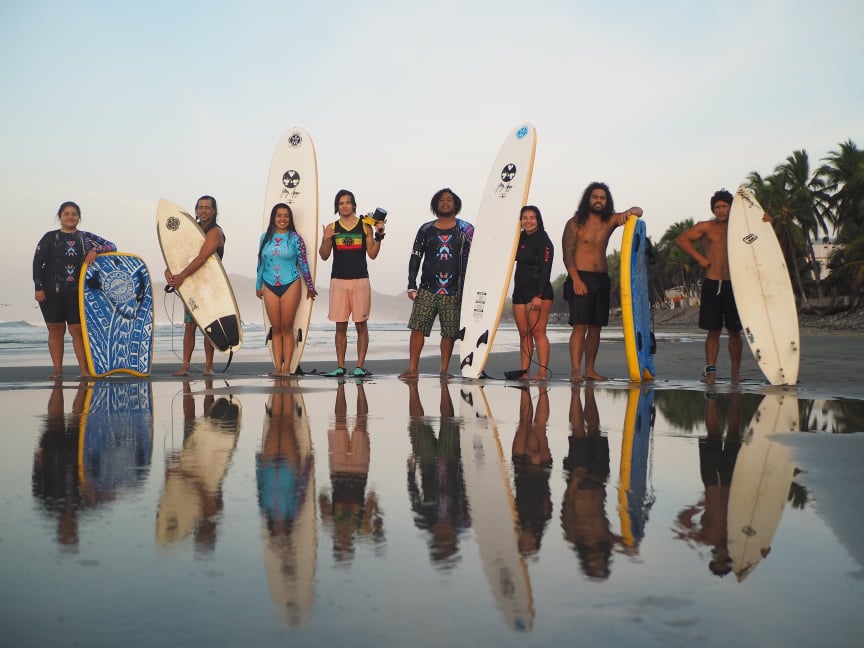
Due to historical and present day forms of racism, including the legacy of colonialism, many Indigenous communities do not have access to the same services and resources as predominantly white communities. Indigenous youth, like all kids, benefit from recreation programs that support their growth and development while affirming their identities. While programs for Indigenous youth don’t always receive the funding, acknowledgement, and research support they deserve, there are many excellent programs led by and designed for Indigenous people. Historical policies that caused the forcible removal of Native youth from intergenerational communities and families to place them in boarding schools still resonate in some modern adoption practices. This pattern of taking Indigenous youth out of Indigenous communities makes Indigenous mentors, youth leaders, and culturally-centered programs all the more critical.
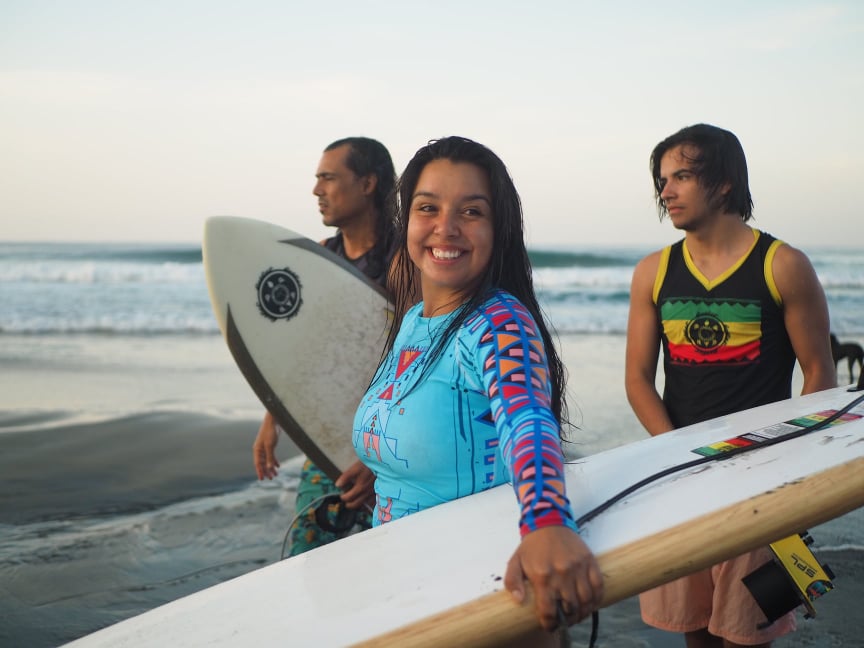
Native Like Water is one NRF grantee actively engaged in this important work. The Native Like Water program was launched in 2014 out of the Young Native Scholars initiative (established 2000) designed to promote academic support, holistic wellness, and cultural connection among native youth. Native Like Water specifically focuses on water-based recreation and coastal conservation through the Indigenous lens of a sacred relationship between humans and water. Native Like Water programs include recreation activities like surfing, STEM-focused curricula related to conservation sciences, and wellness and nutrition support focused on native foods and practices.
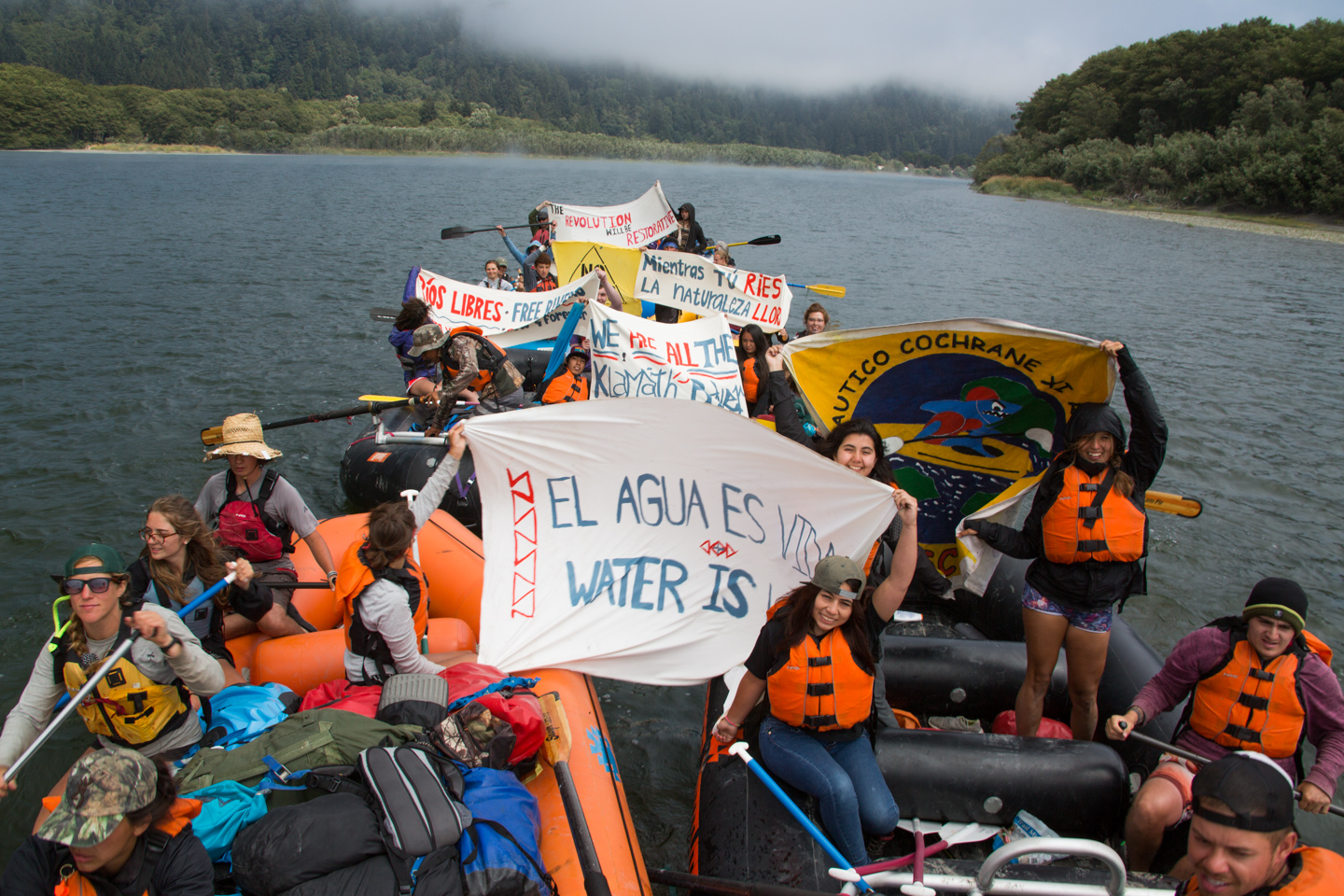
Another NRF grantee working in the Indigenous youth programming sector is Ríos to Rivers. Ríos to Rivers builds outdoor recreation skills, promotes community among Indigenous youth, and fights to protect the integrity of river systems. Youth participants learn about river recreation through paddling instruction and advocate for the protection of rivers under threat from damming. NRF funding supports the Paddle Tribal Waters program, a kayaking and youth leadership program which prepares Indigenous youth from the Klamath Basin to paddle the undammed free-flowing river as the rightful people to make the “first descent” in 2025 after the dams are removed. Participating youth will camp with tribal communities along the way and end in an inter-generational celebration where the Klamath meets the Pacific Ocean.
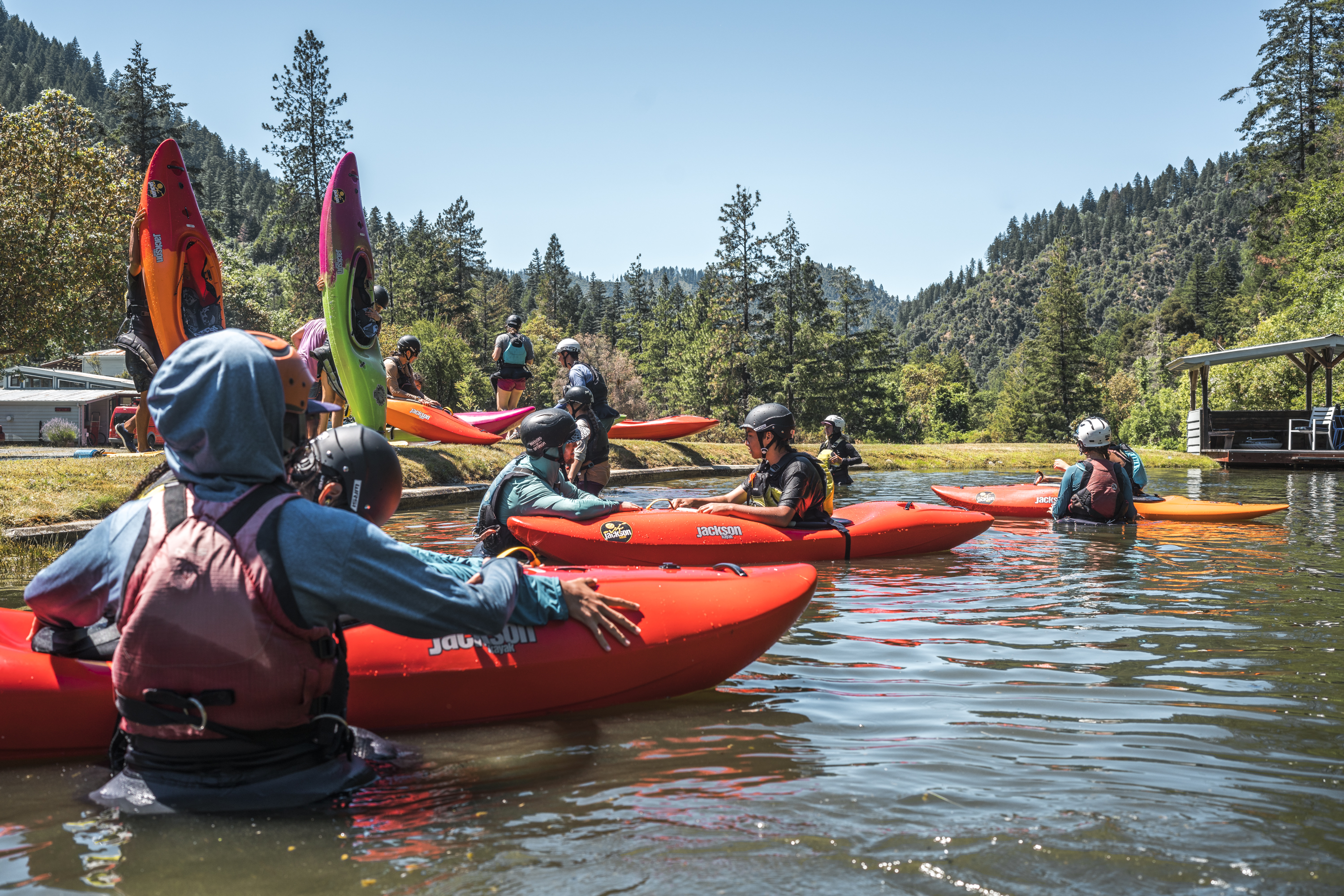
Chief Storyteller of Ríos to Rivers, Paul Robert Wolf Wilson, reflected on his experience with outdoor recreation saying, “Paddling has given me a way of experiencing rivers outside of just showing up to protect rivers’ health or for our traditional food systems. To also be able to recreate on my ancestral waterways inspires great joy and returning a relationship of recreation for tribal youth on their waterways means a strengthening of our cultural identities going forward.” Ríos to Rivers is making similar experiences of joy and restoration through paddling possible for lots of Indigenous youth through its programs.
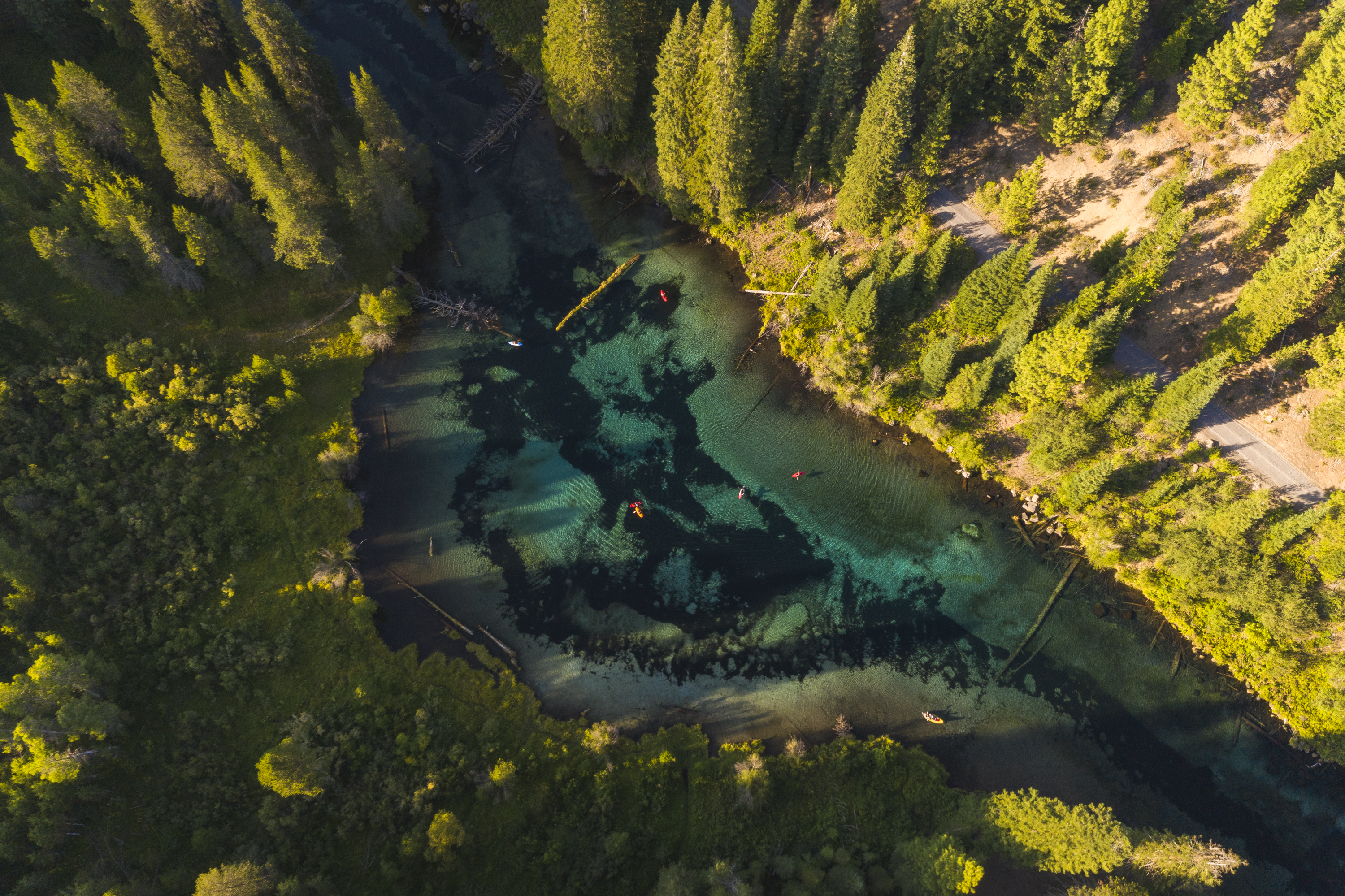
Whether paddling, surfing, testing water quality, or protesting a proposed dam, Indigenous youth can build meaningful connections within their own communities and across borders through intentional and supportive recreation programs. The best youth recreation programs focus on fostering a sense of agency, community, and culture, as much as they focus on technical skill development. All youth should have access to programs in which they feel proud and connected to their identity and culture, rather than ashamed and isolated. Native Like Water and Ríos to Rivers are just two of the many organizations working hard to make this a reality for Indigenous young people.
NRF understands that equitable support of outdoor recreation programs means that funders need to be intentional in their support of Indigenous leaders working to create these culturally-relevant opportunities for youth, even if it means shifting traditional philanthropic practices and timelines to make it possible.
